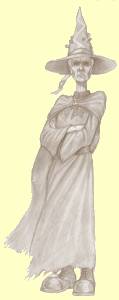Equal Rites
Today I completed my first re-reading of the summer project by finishing Equal Rites. It's been years since I last read it, and I didn't recall most of the story. Equal Rites was my introduction to Granny Weatherwax back when I read it the first time, and I didn't like Granny all that much until very recently. Re-reading E.R., it was hard to say whether I'd been unfair to Granny back then, or if the fact that I like her now--very much--was coloring my re-reading of her first starring role.
E.R. is definitely not on par with Pratchett's later, better books, but it wasn't truly awful. It gave me the feeling that the city of Ankh-Morpork hadn't really been fully conceived yet, which is probably perfectly accurate. There wasn't a lot of continuity between the place-details in The Colour of Magic, The Light Fantastic, and E.R.. This is most noticeable when it comes to Unseen University. In later books, the faculty is pretty stable, and there are several recurring characters, including the Bursar and the Archchancellor, Mustrum Ridcully. No one recognizable has arrived yet in E.R., with the exception of the Librarian. The culture and physical setting of the Ramtop Mountains and main character Esk's village of Bad Ass are depicted in good, solid detail. Ankh-Morpork itself is beginning to take shape, but hasn't yet begun to occupy the nearly-a-character role it takes on in later books.
Granny is not as fleshed out as she will become in later appearances, but the framework is there, and some of the filling-in is starting to take shape. Pratchett's irreverent style and throw-away one-liners haven't quite come into their own yet, either, but two passages did catch me just right:
"They had been in Ankh-Morpork for three days and Granny was beginning to enjoy herself, much to her surprise. She had found them lodging in The Shades, an ancient part of the city whose inhabitants were largely nocturnal and never inquired about one another's business because curiosity not only killed the cat but threw it in the river with weights tied to its feet. The lodgings were on the top floor next to the well-guarded premises of a respectable dealer in stolen property because, as Granny had heard, good fences make good neighbors."
"[Granny] stood up. 'Let's find this Great Hall, then. No time to waste.'
'Um, women aren't allowed in,' said Esk.
Granny stopped in the doorway. Her shoulders rose. She turned around very slowly.
'What did you say?' she said. 'Did these old ears deceive me, and don't say they did because they didn't.'
'Sorry,' said Esk. 'Force of habit.'
'I can see you've been getting ideas below your station,' said Granny coldly.'"

http://www.users.bigpond.net.au/terrypratchett/Char_GWeatherwax.htm
E.R. is definitely not on par with Pratchett's later, better books, but it wasn't truly awful. It gave me the feeling that the city of Ankh-Morpork hadn't really been fully conceived yet, which is probably perfectly accurate. There wasn't a lot of continuity between the place-details in The Colour of Magic, The Light Fantastic, and E.R.. This is most noticeable when it comes to Unseen University. In later books, the faculty is pretty stable, and there are several recurring characters, including the Bursar and the Archchancellor, Mustrum Ridcully. No one recognizable has arrived yet in E.R., with the exception of the Librarian. The culture and physical setting of the Ramtop Mountains and main character Esk's village of Bad Ass are depicted in good, solid detail. Ankh-Morpork itself is beginning to take shape, but hasn't yet begun to occupy the nearly-a-character role it takes on in later books.
Granny is not as fleshed out as she will become in later appearances, but the framework is there, and some of the filling-in is starting to take shape. Pratchett's irreverent style and throw-away one-liners haven't quite come into their own yet, either, but two passages did catch me just right:
"They had been in Ankh-Morpork for three days and Granny was beginning to enjoy herself, much to her surprise. She had found them lodging in The Shades, an ancient part of the city whose inhabitants were largely nocturnal and never inquired about one another's business because curiosity not only killed the cat but threw it in the river with weights tied to its feet. The lodgings were on the top floor next to the well-guarded premises of a respectable dealer in stolen property because, as Granny had heard, good fences make good neighbors."
"[Granny] stood up. 'Let's find this Great Hall, then. No time to waste.'
'Um, women aren't allowed in,' said Esk.
Granny stopped in the doorway. Her shoulders rose. She turned around very slowly.
'What did you say?' she said. 'Did these old ears deceive me, and don't say they did because they didn't.'
'Sorry,' said Esk. 'Force of habit.'
'I can see you've been getting ideas below your station,' said Granny coldly.'"

http://www.users.bigpond.net.au/terrypratchett/Char_GWeatherwax.htm
Labels: Terry Pratchett










0 Comments:
Post a Comment
<< Home